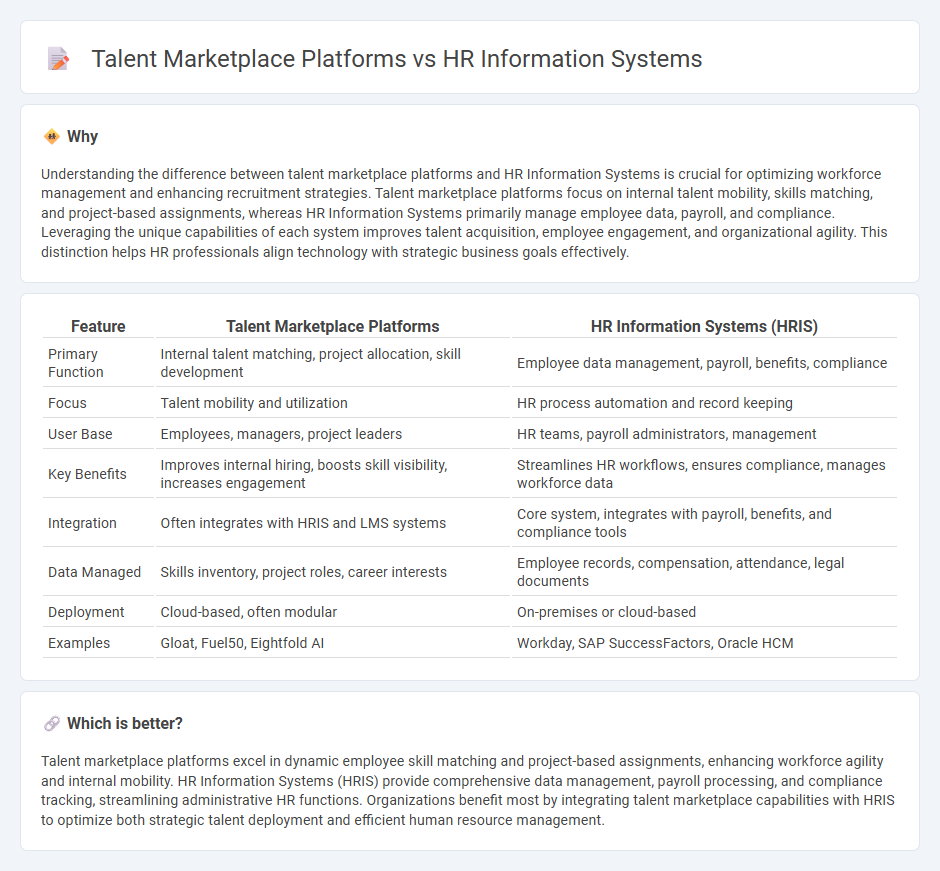
Talent marketplace platforms enable dynamic workforce agility by matching employees' skills with project demands in real-time, enhancing internal mobility and skill development. HR Information Systems (HRIS) focus on centralized data management for payroll, benefits, and compliance, streamlining administrative HR tasks. Explore how integrating talent marketplaces with HRIS can revolutionize workforce management and employee engagement.
Why it is important
Understanding the difference between talent marketplace platforms and HR Information Systems is crucial for optimizing workforce management and enhancing recruitment strategies. Talent marketplace platforms focus on internal talent mobility, skills matching, and project-based assignments, whereas HR Information Systems primarily manage employee data, payroll, and compliance. Leveraging the unique capabilities of each system improves talent acquisition, employee engagement, and organizational agility. This distinction helps HR professionals align technology with strategic business goals effectively.
Comparison Table
| Feature | Talent Marketplace Platforms | HR Information Systems (HRIS) |
|---|---|---|
| Primary Function | Internal talent matching, project allocation, skill development | Employee data management, payroll, benefits, compliance |
| Focus | Talent mobility and utilization | HR process automation and record keeping |
| User Base | Employees, managers, project leaders | HR teams, payroll administrators, management |
| Key Benefits | Improves internal hiring, boosts skill visibility, increases engagement | Streamlines HR workflows, ensures compliance, manages workforce data |
| Integration | Often integrates with HRIS and LMS systems | Core system, integrates with payroll, benefits, and compliance tools |
| Data Managed | Skills inventory, project roles, career interests | Employee records, compensation, attendance, legal documents |
| Deployment | Cloud-based, often modular | On-premises or cloud-based |
| Examples | Gloat, Fuel50, Eightfold AI | Workday, SAP SuccessFactors, Oracle HCM |
Which is better?
Talent marketplace platforms excel in dynamic employee skill matching and project-based assignments, enhancing workforce agility and internal mobility. HR Information Systems (HRIS) provide comprehensive data management, payroll processing, and compliance tracking, streamlining administrative HR functions. Organizations benefit most by integrating talent marketplace capabilities with HRIS to optimize both strategic talent deployment and efficient human resource management.
Connection
Talent marketplace platforms integrate seamlessly with HR Information Systems (HRIS) to enhance workforce management by providing real-time data on employee skills, availability, and career aspirations. This connection allows HR professionals to optimize talent allocation, streamline recruitment, and support internal mobility through centralized data synchronization. The synergy between these technologies improves decision-making and drives organizational agility by leveraging comprehensive employee insights.
Key Terms
Data Integration
HR Information Systems (HRIS) centralize employee data, payroll, benefits, and compliance information, ensuring streamlined operations and accurate reporting. Talent marketplace platforms prioritize dynamic skill matching, project-based assignments, and internal mobility by integrating real-time data on employee capabilities and availability. Explore in-depth comparisons on data integration strategies to optimize workforce management.
Workforce Analytics
HR Information Systems (HRIS) primarily centralize employee data and streamline administrative processes, enabling organizations to maintain accurate workforce records and generate essential reports. Talent marketplace platforms leverage workforce analytics to dynamically match employee skills with internal project opportunities, enhancing agility and talent utilization. Explore how integrating these platforms transforms workforce management by boosting predictive insights and strategic talent deployment.
Internal Mobility
HR Information Systems (HRIS) provide comprehensive employee data management, payroll, and compliance tools essential for operational efficiency, while talent marketplace platforms specifically enhance internal mobility by matching employees with relevant internal opportunities based on their skills and career aspirations. Talent marketplaces leverage AI-driven algorithms to facilitate skill-based project matching, fostering employee growth and reducing turnover. Explore how integrating these systems can revolutionize your organization's talent management strategies.
Source and External Links
What Is HRIS? - A Human Resources Information System (HRIS) is software that maintains and manages detailed employee data and HR policies, automating and streamlining HR processes such as talent acquisition and payroll while improving efficiency and record-keeping.
What is an HRIS (Human Resource Information System)? - An HRIS centralizes and automates core HR functions including payroll, benefits, time tracking, and employee data management, enhancing operational efficiency, compliance, and employee experience through self-service and data-driven decision making.
What Is an HRIS? How IT and HR Are Evolving Together - HRIS platforms serve as centralized databases for employee data and integrate crucial components like scheduling, labor optimization, and analytics, facilitating both HR and employees to access and manage their data, which boosts trust and productivity.
 dowidth.com
dowidth.com